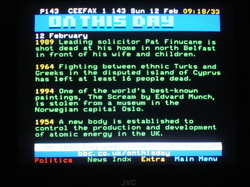Commemorative events reveal more about the present than they do the past. For proof of this we can look to the year 2019. How will the centenary of Afghan independence be marked? Will it feature musical performances and history assignments written by Afghan schoolgirls? If so, it will be apparent that at least some of the goals of the Western forces have been met. If not, it will probably be because the Taliban have resumed full control. They too will no doubt mark the centenary, but in a manner that will accord with their norms.
We can at least take one positive thing from all this: history matters. For as soon as we begin to explore the past we start to address the issues of the present. That both are equally contested is bloodily apparent to the people of Afghanistan and the soldiers that are waging a war in their midst.
___________
Supplemental
Listening to the news broadcasts on BBC Radio 4 this morning (20/08/2011) brought home to me just how important anniversaries are when it comes to framing present-day events. Three of the top news stories were given temporal, commemorative frames:
- One month has passed since the terrorist attacks in Norway that left 77 people dead
- It is two years to the day since the release of Abdelbaset Ali Mohmed al-Megrah, the Libyan accused of placing a bomb on Pan Am Flight 103, an aircraft that exploded over the Scottish town of Lockerbie on 21 December 1988 killing 270 people
- Exactly twenty years ago an unsuccessful attempt was made to stage a coup d'état that would seize control from the then Soviet president, Mikhail Gorbachev







